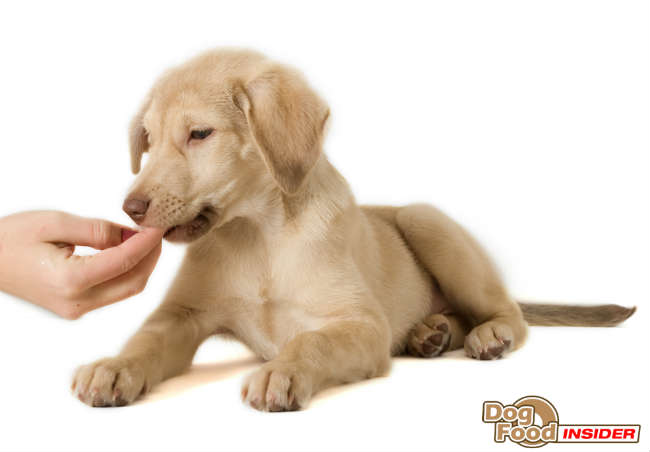
This post may contain affiliate links. We are compensated for referring customers to our affiliate partners.
 Puppies bring enormous joy and happiness to our lives, but they’re also a big responsibility. When you bring a new puppy home, if you’re like me, you want everything to be perfect for him and that includes his food. But there are so many foods! How do you know what to feed him? Here’s what I tell people about feeding a puppy.
Puppies bring enormous joy and happiness to our lives, but they’re also a big responsibility. When you bring a new puppy home, if you’re like me, you want everything to be perfect for him and that includes his food. But there are so many foods! How do you know what to feed him? Here’s what I tell people about feeding a puppy.
Find Out What Your Puppy Has Been Eating
Before you ever bring your new puppy home you should try to plan ahead as much as possible. Whether you’re getting your puppy from a breeder, a shelter, a friend, or any other source, you’ll cut down on problems if you plan ahead. (Plus, it’s always best if you don’t get a puppy as an impulse.) So, not only will you have bowls for your puppy’s food and water waiting, but you will have found out what your puppy is currently eating. This is important because you will want to continue to feed your puppy the same food at first. Puppies have sensitive digestive systems and any sudden change in their food can lead to an upset stomach and an unhappy puppy. So, find out what your puppy has been eating and buy a small bag or some cans of the same food, even if you don’t like the food. It’s only for a few days unless you intend to keep feeding it.
Get Reviews From Dog Owners Like You
– OR –
Read Reviews For Top Rated Wet Puppy Food
Talk To Some Experts
Next, on the agenda is a trip to the vet with your puppy. It’s always a good idea to take your puppy to the vet within the first 72 hours of bringing him home for a check-up. This is true no matter where you obtain your puppy. If your vet finds anything wrong with your puppy or if he’s sick, you can contact the breeder or shelter and let them know. This is especially important if your puppy has something contagious because they will need to take steps regarding their other dogs.
When you see your puppy’s vet you should talk to him or her about your puppy’s diet. Many vets will make some recommendations about what to feed your puppy. You can take these recommendations into consideration. If you got your puppy from a breeder they will probably have some advice about what to feed your puppy, too. Sometimes shelter volunteers can offer advice about what to feed. These are all people you will probably want to talk to for their viewpoints. Whether you follow any of this advice is up to you. Often these people have extensive experience with puppies like yours so they can offer good advice. But sometimes the advice is not so good.
Feeding Your Puppy
Most puppies will do well if you feed them three meals per day from about the age of two months until six months. After that time you can usually transition them to two meals per day. It’s best if you feed your puppy a regular portion that you measure at each meal. Leave the food down for your puppy for about 15 minutes and then remove any food that he hasn’t eaten. It’s not a good idea to leave food down for your puppy all the time. Free feeding usually leads to overweight puppies which can be especially unhealthy for larger breeds and result in hip dysplasia and other joint problems later in life. Free feeding a puppy also makes house training much more difficult.
Special Considerations
There are some special things to consider, depending on your puppy’s size or breed. If you have a purebred puppy it’s a good idea to read some books about the breed to acquaint yourself with raising puppies of that breed. Books written by breed experts can offer valuable advice.
If you have a large or giant breed dog such as a Great Dane then you will probably want to choose a puppy food for large breeds. Many large breed dogs grow very rapidly as puppies and it’s important that they have food that is formulated for slower growth. If they grow too fast they can develop joint and skeletal problems later. They need less calcium than other breeds. These foods are usually lower in calories, too, to help giant breeds stay lean. Carrying too much weight at a young age can be harmful. People who have dogs that are prone to hip dysplasia and other joint disorders may also want to feed these puppy foods.
Toy and very small puppies can also have some special issues. They can be prone to hypoglycemia. With these very small puppies it’s usually advisable to feed multiple small meals during the day to keep their blood sugar levels from dropping too much. You may also want to give them some little snacks between meals.
Kibble Or Canned?
Choosing to feed your puppy kibble or canned food is a personal choice. Dogs can get good nutrition from both kinds of food. However, most owners feed medium and large dogs kibble because it is easier on the pocketbook. It’s extremely expensive to try to feed a large dog a canned food diet. Toy and small puppies will do well on both kinds of food.
Should You Add Supplements To Your Puppies Food?
In general, the answer is no. Dog and puppy food is typically balanced for good nutrition, especially if it meets AAFCO approval. When you add supplements to your puppy’s food you risk throwing his diet out of balance. Too much calcium or too many vitamins and you could inadvertently cause a health problem instead of making your puppy healthier.
Should You Give Your Puppy Table Scraps Or Food From The Kitchen?
It doesn’t usually hurt your puppy to give him a few bites from your plate or a few things from the kitchen but if you consistently give your puppy lots of table food you run the risk of making his dog food diet unbalanced. If you give your puppy lots of things from the table you are also going to end up with a dog who begs a lot. But, from a nutrition viewpoint, it’s okay to give your puppy a taste of things now and then, but he should be getting most of his food from his dog food – unless you intend to change him over to a homecooked diet, and that’s a different subject.
Which Puppy Food Should You Feed?
That’s hard to say. In many cases the same companies which make good adult dog foods make good puppy foods. Choose a food that has been approved by AAFCO for All Life Stages or specifically for Puppies. It’s also better to choose a food that has been approved as a result of feeding trials instead of nutrient profiles. Puppies are even more susceptible to nutritional deficiencies than adult dogs. A feeding trial is a better measurement of the food’s nutrition than a nutrient profile. This will leave out a lot of good foods from smaller companies because they do not spend the money to do feeding trials, but you don’t want to take chances with your puppy’s health. Once your puppy is a year or older and has finished most of his growth you can change to a different food if you prefer.
The National Research Council in the Nutrient Requirements of Dogs and Cats recommends that puppies have 28 percent protein in their diet and 17 percent fat. This is considerably more protein than they recommend for adult dogs (18 percent) and twice the minimum fat amount (9 to 15 percent). Puppies need lots of protein and fat for growth but you can find these amounts in many good dog foods that have conducted feeding trials.
It probably sounds obvious, but if you choose a good food and don’t overfeed your puppy, especially in the first year, you’ll be taking a big step toward keeping him healthy for the rest of his life.
– OR –
Read Reviews For Top Rated Wet Puppy Food
